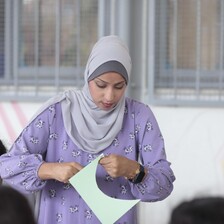The Electronic Intifada 12 February 2024

After Israel’s warnings that it will soon undertake a major offensive against Rafah, some families have begun leaving that city.
APA imagesOne question is being asked more than any other in Gaza: When will the war stop?
Everybody wants to hear news of a ceasefire that will prevent further destruction and stop the spread of hunger and disease among people who have been displaced.
Khaled Ramadan, 40, was first uprooted from al-Qarara, east of Khan Younis, a city in southern Gaza.
He then went to a training center run by the UN agency for Palestine refugees (UNRWA) in Khan Younis. Later he moved to al-Mawasi, another neighborhood in the Khan Younis area.
“Every time I move, I go through a long struggle to adapt to the new place,” he said. “I have to search for water and food and find wood to light a fire so that I can protect the children from the cold. My children ask me every day, ‘When will we go back to our home?’”
“I miss having a full night’s sleep,” he added. “I can only sleep for a few hours and I am very anxious when I wake up.”
With food scarce and prices of items still available skyrocketing, he cannot afford to provide for his family. They are relying on canned food from aid donors.
“Our stomachs are tired of canned food. We crave the proper food we ate before the war.”
Ramadan said that he had hoped that the war would end within the week after it was declared in October.
“The way it has continued has exhausted us,” he said. “It has increased our pain greatly. We have had enough destruction and death.”
Traumatized
Rima Tabsh, 37, is from Abasan, east of Khan Younis. After being uprooted, she and her four children have been living in a tent.
The children have been constantly unwell during cold weather. Their illnesses have included gastroenteritis.
“The tent is not a shelter,” she said. “It is the opposite of shelter.”
“I have a big house and the children have their own rooms and toys. Now they spend their time playing in the sand in front of the tent.”
The children are traumatized. At night time, they ask if Israel’s missiles are going to fall on them.
Following orders that they leave their home, Tabsh and her family went to Tal al-Sultan, near Rafah – Gaza’s southernmost city. They are disturbed by warnings from Benjamin Netanyahu and other figures in the government he leads that Rafah will soon be subjected to a major attack and that the approximately 1.3 million civilians crammed into it will have to evacuate.
“Why do they want to displace us again?” she asked. “We have already lost our souls from being displaced from one place to another. This war and all the suffering that goes with it must be stopped for the sake of the children.”
Salem Jaber, 55, lives in Khan Younis refugee camp.
A few weeks ago, he was shocked to hear the sound of Israeli tanks and bulldozers. Israeli troops had entered the area around the hospital run by Al-Khair Foundation, a charity based in Britain.
“I used to say that we were a refugee camp and they would not invade it,” Jaber said. “I was waiting for a ceasefire so that we would escape displacement. But we were forced to leave our house in front of the tanks.”
“The children were extremely frightened by what they saw,” he added. “We left, shivering from the cold and fear. I left my home behind me and I don’t know if it was destroyed or if it’s still intact.”
Jaber’s father died shortly before the current war on Gaza was declared. He was 90 and had experienced the Nakba, the 1948 ethnic cleansing of Palestine.
Like so many others in Gaza, Jaber is hoping that the US – which has supplied an enormous amount of the weapons Israel uses to commit genocide – will now exert sufficient pressure so that a ceasefire is called.
Optimism is vital as the alternative is too ghastly to contemplate.
If a major offensive is undertaken against Rafah, “we will lose many lives,” Jaber said.
“We must end this war to save us from death. We must end the torment we are going through.”
Ruwaida Amer is a journalist based in Gaza.





